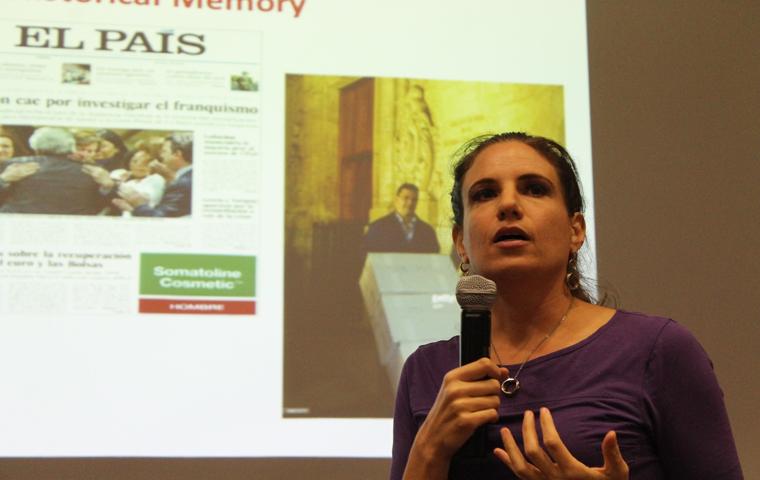
As a hushed audience listened, visiting lecturer Alison Guzman discussed the relationship between theater and historical memory, particularly for playwrights following the Spanish Civil War.
The adjunct assistant professor of Spanish at Providence College in Rhode Island delivered her presentation on Oct. 28 as part of the annual Sydney Berger Lecture Series sponsored by the Liberal Arts department.
David Hitchcock, associate professor of Spanish, said Guzman’s impressive list of publications includes the introduction to the original Spanish version “Todos Los Que Quedan,” the play that premiered at the university on Oct. 29. The play discusses the outcomes of the Spanish Civil War, which fits Guzman’s interest in that time period.
“(Guzman’s) specific areas of scholarly interest have been feminism, postmodernism and the historical memory of the Spanish Civil War,” Hitchcock said.
Guzman’s interest in the concept of historical memory shone through her animated gestures and detailed presentation.
“For a long time, history was divided from memory,” Guzman said. “History was something taught in textbooks and museums, and memory was something that individuals had.”
Later, the idea of collective or historical memory emerged, fusing the twin concepts of history and memory, Guzman said.
“Historical memory is obviously not something that just happens in Spain,” Guzman said. “We have it here.”
Guzman provided many examples of American historical memory. The first example was the Iraq War, which caused the current destabilization in Iraq. Another example was that the contemporary Black Lives Matter movement came from the historical oppression of African Americans. In this way, current events stem from events in history.
In Spain, the leadership following the Spanish Civil War suppressed discussion of the past. Under the fascist leadership of Francisco Franco many playwrights were exiled or jailed. Rampant censorship served to defend the ruling Nationalists.
“The few brave Republican playwrights who wrote during this time had to stage their plays in small houses, trying to keep the word from getting out so that they wouldn’t be thrown in jail,” Guzman said.
During this time dissenting playwrights could not connect with the public because their plays could not be staged in a normal theater setting, she said.
“The objective of theater is for the performance to connect with an audience, and they didn’t have that,” Guzman said.
After Franco’s rule, the Pacto del Olvido, or Pact of Forgetting, served as an attempt to bury the past. Over time, however, the pact of silence was broken. Through metatheatre and surrealism, playwrights discussed the Spanish Civil War and its effects, Guzman said.
“The type of theater that was being written or performed started to change,” Guzman said, “and now historical memory theater is becoming more popular.”
After Guzman’s presentation, members of the audience gathered for coffee and had the opportunity to meet the lecturer.
Jenny Wagner, a sophomore English education major, said the presentation taught her a lot about a time in Spain she had never considered before.
“I love drama, so it was really interesting to me how drama connected to (an event in history) that I didn’t know about,” Wagner said.
Wagner said the most unbelievable part of the presentation was when Guzman said Francisco Franco censored Spanish playwrights for 36 years, and then the following leadership suppressed speech related to the civil war for the next seven years.
“We appreciate freedom of speech so much here in America,” Wagner said. “So for me, that was the most crazy thing.”
Another member of the audience, Darius Wilson, said the presentation gave good insight into a part of Spain Americans don’t often hear about.
“The most interesting part was when (Guzman) talked about the time when they were forced to forget what was going on,” the senior exercise science major said, “and the fact that it’s today’s generation that’s starting to talk about it again and starting to find justice for it.”


